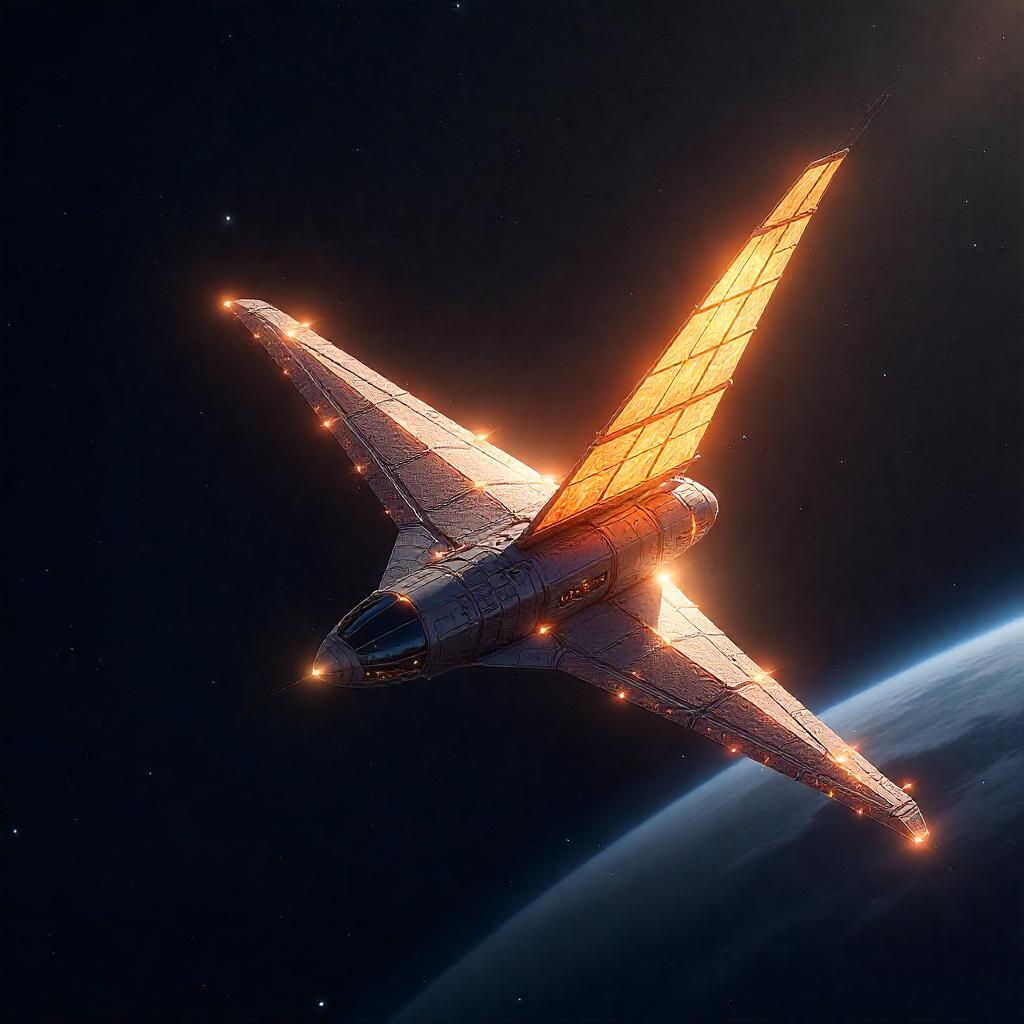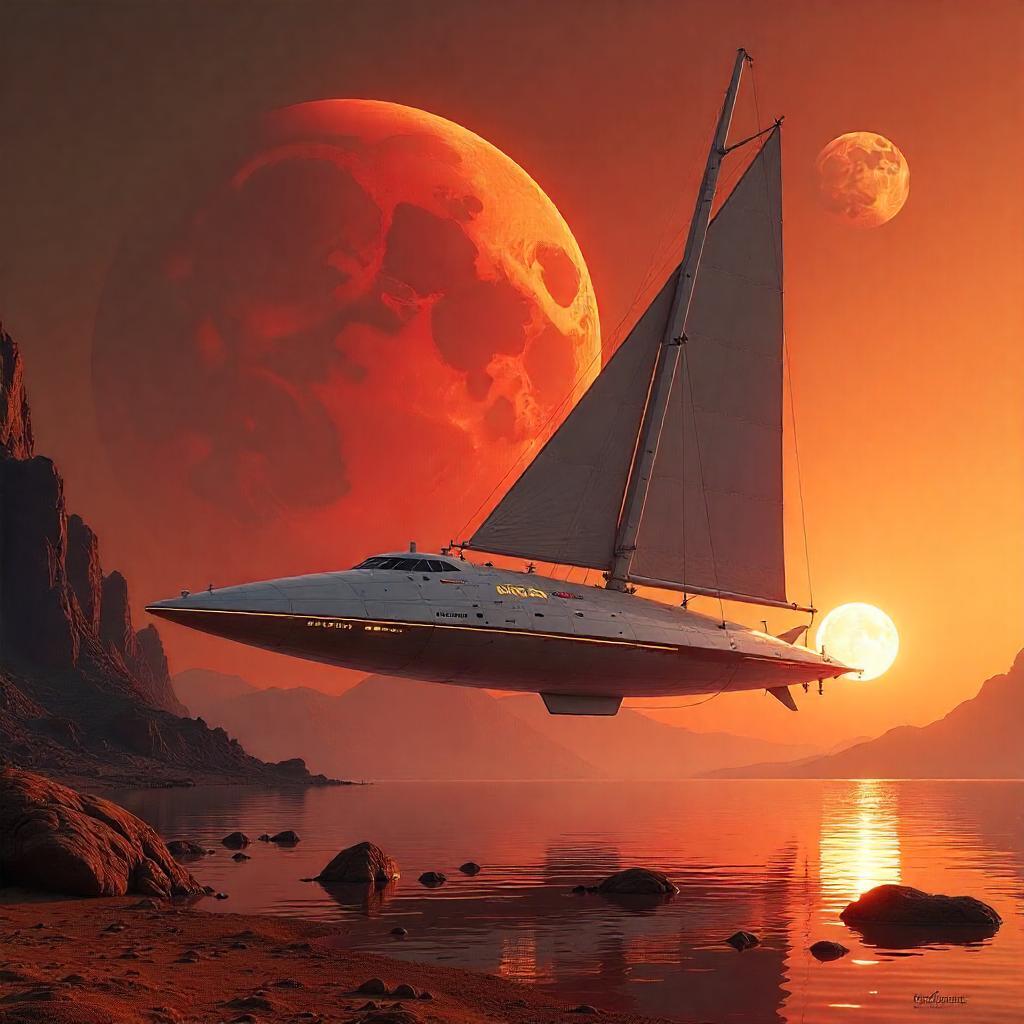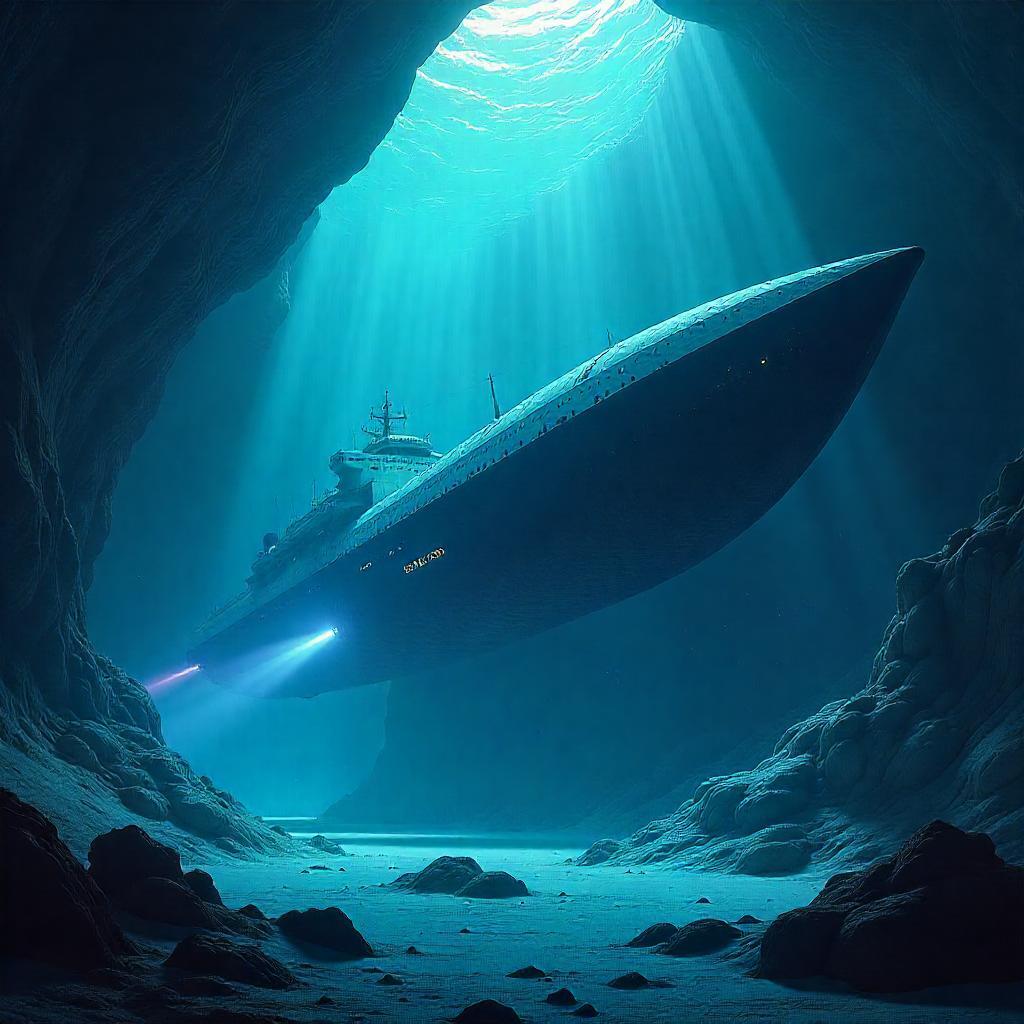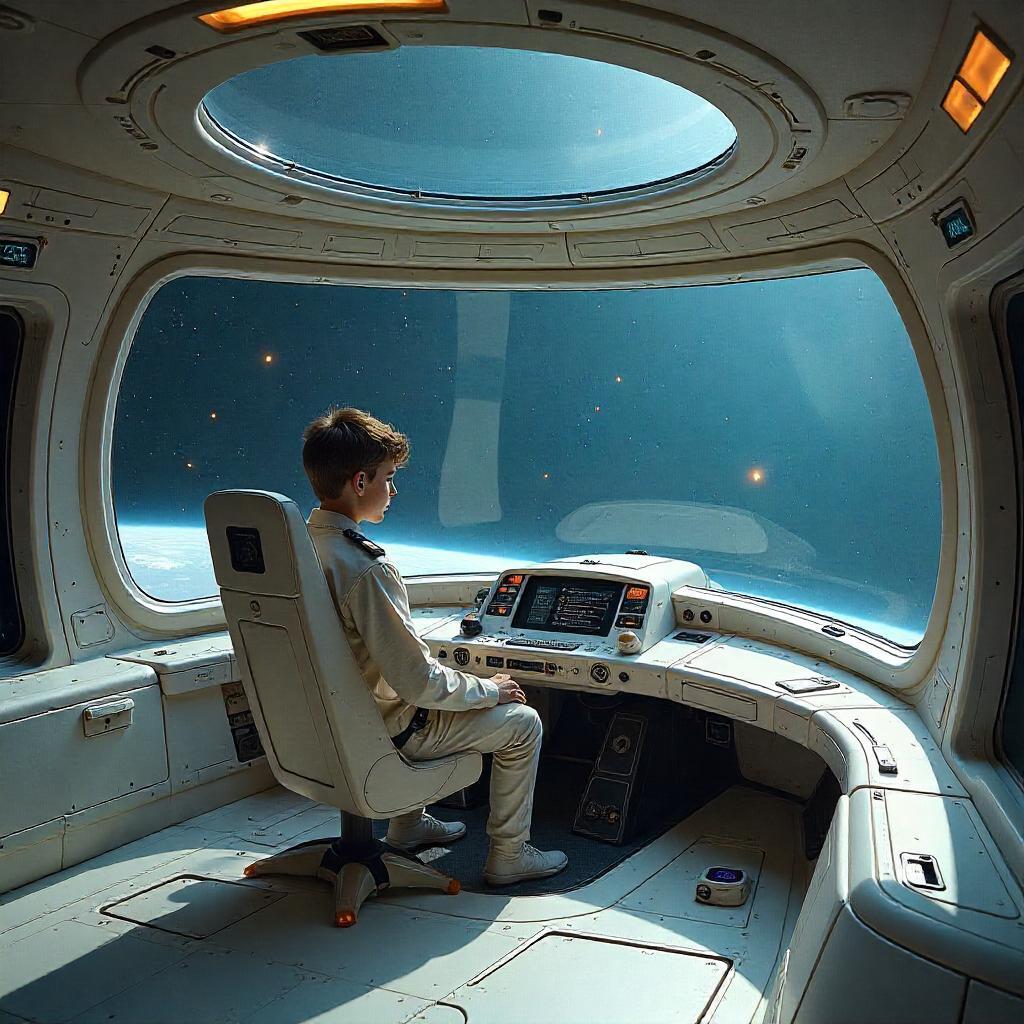Silence Between Stars : Lightsail to New Atlantis

Prologue
By the dawn-amber glow of a young Martian morning, crimson dunes rolled away beneath a living sky— a sky now thick with drifting clouds and the blue tinge of breathable air. Two centuries after the first rockets kissed the red sand, humanity had crossed the cosmic threshold: a Type II civilization, harvesting the full radiance of Sol while cities glittered from Mercury’s fire-forged shade to Neptune’s icebound rings. Mars, once a desolate rusted desert, had become Earth’s vibrant twin—forest-striped, ocean-dappled, and thrumming with the chatter of birds that had never known gravity quite this gentle.
In the neon labyrinth of Onyx City, where skyscrapers pulsed with holo-ads and canals shimmered with bioluminescent koi, lived Maverock Orion Vale— starship mechanic, avid gamer, and restless dreamer. Like many Post-Flesh citizens, he could have merged his mind with the quantum heavens of digital immortality, surfing simulated galaxies whose code ran faster than light. Yet Maverock chose the taste of wind in his lungs and the rasp of alloy beneath his fingertips. He had welded his own vessel— the SS Mars Pilgrim, its diamond-sheathed lightsail folded like an angel’s wing—on a rented pad overlooking Olympus Bay. When the sail unfurled it would catch the photon tide and, if luck favored, carry him beyond the warm cradle of the Solar reach.
What drives a wanderer when every world in the system is already mapped, catalogued, and tamed? Perhaps it was the silence between stars, or the rumor that life—real, alien, untranscoded—might be waiting in that hush. NASA-Europa Expansions had put out a call: solitary scouts willing to slip past the heliopause and listen. Maverock answered with a grin.
On the eve of departure he walked the harbor platforms, lights from orbital mirrors painting silver paths across the water. Cargo drones hummed overhead; terra-kites wheeled on desert thermals. Somewhere in the bustle he paused, palm against the hull of his ship, feeling its heartbeat through the plating— a steady thrum that promised distance, danger, and stories no holodeck could counterfeit.
Beside him stood AURORA-13, the polished chrome droid who would serve as pilot, companion, and—when Maverock’s eyes closed in the VR chambers—guardian of the dream. Together they would chase faint spectrographic signatures and impossible hopes into the dark.
None aboard those glittering orbital hubs guessed what waited far beyond the Kuiper veil: a frozen exoplanet that could swallow starships whole, a drowned empire named New Atlantis, and a sea-god who spoke in light.
But destiny, like starlight, travels a long road. And so, beneath twin moons and a sky newly born, the SS Mars Pilgrim lifted from the red soil— sails unfurling, engines singing— toward mysteries older than Earth, older than Mars, and older than human longing itself.
--
Silence Between Stars
The last echoes of the launch sirens still quivered in the steel bones of Onyx Harbor when Maverock tilted the SS Mars Pilgrim toward dawn. With the lightsail packed tight against the hull the ship seemed almost shy—an argent seed cupped in an invisible hand—yet even before the clamps released he felt the craft straining for sky.
“Separation in three… two…” AURORA-13’s voice chimed, warm metal wrapped in birdsong.
Mag-rails spat a thunderless pulse. Weight vanished. Olympus Bay, rimmed in pearl and rose, fell away in a slow cartwheel. Then the sail blossomed. Diamond lattice caught Sol’s newborn photons; pressure no stronger than butterfly breath gathered behind the broad wings and shoved the Pilgrim outward with patient ferocity.
Below, crimson continents and turquoise seas fused into a single radiant coin. Mars had never looked so alive—or so small. For a moment Maverock’s chest tightened with what might have been fear, but the feeling fractured into wonder as the sail bit harder into light and the planet rolled behind him. Ahead lay vacuum older than language and rumors older than fear. He smiled into the dark.
1. Crescendo of Light

Photon propulsion was a lesson in surrender. The thrust never jolted or roared, only layered acceleration grain by grain until velocity eclipsed imagination. By the time the Pilgrim swept past Jupiter, the mighty planet’s sunrise storms unfolded in slow motion beneath them. Thunderheads bigger than worlds brewed ochre and cream; lightning stitched their crests with blue fire, each bolt wide enough to birth a moon.
AURORA angled the sail, carving momentum from the gas giant’s orbit. Gravity whiplashed the ship sun-ward, then flung it star-ward on a fresh vector—an arrow pointed at the uncharted dark between Vega and Sheliak. Instruments hummed. The stars ahead no longer seemed fixed; parallax crept through the canopy glass like a living thing.
Nights on the Pilgrim tasted of aluminum and quiet. Maverock fell into rhythms: inspection rounds, exercise in the spin-tube, micro-meals that smelled faintly of vanilla protein. He tinkered with the secondary nav-core, tuned AURORA’s voice for subtle laughter, and sometimes drifted in the holodeck: a one-man expedition inside No Man’s Sky. In fractal jungles of code he practiced climbing basalt arches and charting alien flora. Training, he insisted when AURORA teased him. Besides, the loneliness is louder when I’m awake.
She never argued—only recorded his REM cycles and adjusted ciradian lights so that dreams bled softly into waking.
2. Rain of Glass
Day 49, 0300 ship-time, the radar began to cough. A stream of micrometeoroids—debris from a long-shattered comet—sliced across their course at fifty kilometers a second. Maverock collapsed the lightsail in tightening spirals; electrostatic shields crackled violet around the hull. The first impacts rang like hammer blows on a cathedral bell. One fleck punched a pinhole through the starboard radiator; vaporized ammonia hissed moon-white into vacuum.
For twelve hours the ship bunkered behind its own inertial mass while invisible hail etched char into the hull. Maverock refused sedation. He floated in the maintenance bay, hands inside haptic sleeves, welding aerogel patches onto the ragged rupture. The suit’s heater fought back frost climbing his visor. When it was done—radiator sealed, sail unscarred—he stripped gloves with numbed fingers and exhaled a laugh that fogged the cabin for a heartbeat.
AURORA handed him a bulb of lemon water. “You saved our wing.”
“I saved the wind it drinks,” he corrected, voice raw but triumphant.
Outside, the last shards of comet dust spun off into infinity, glittering like a shoal of dying fireflies.
3. Thread of Nothing
Crossing the heliopause felt at first like nothing at all: a shift in particle count, a hush in the ship’s static. Then came the distortion—subtle as a breath on frosted glass. Background stars bent into concentric halos and snapped back again. Gravitation without mass.
“Non-baryonic filament detected,” AURORA reported. “Dark-matter braid, or guided structure.”
“Guided?” Maverock whispered, as if the vacuum might overhear.
“Perturbations suggest deliberate weaving.”
For ninety seconds the Pilgrim sang ultrasonically, as though invisible fingers plucked its tensioned spars. Then silence returned. Data logs rolled static. No debris, no radiation spike—only the memory of pressure where none should be. That night Maverock dreamed of titans sewing velvet with needles of gravity.
4. Three Notes

Day 123 delivered music. Across the wide-band receiver drifted three tones, each a perfect fifth above the last, repeating every 91.2 seconds. No pulsar, no human beacon matched the signature. Infrared sweep found a dim red dwarf fourteen light-years ahead, orbited by one sizeable planet.
“Artificial probability: sixty-three percent,” AURORA breathed. Empathy routines or true excitement? Maverock couldn’t tell.
He pivoted the Pilgrim by a fraction of a degree. Photon thrust realigned; the sail gulped starlight with fresh appetite. In the silence that followed they listened to the triplet pulse—three notes looping endlessly against infinity. Maverock felt something in his chest resonate, a tuning fork struck at birth finally answering its echo.
5. Winter’s Gate
Eleven months later the dwarf star bled red across the viewport like a dying coal. Its solitary planet—cataloged only as Gliese-D1E—shimmered white-blue beneath a crust of reflective ice. Surface temps: −220 °C. Atmosphere: thin nitrogen, argon trace. Spectrographs, however, hinted at sub-glacial salinity and plumes of water vapor venting through fissures. Life’s fingerprint hiding under frost.
Orbit injection was smooth until the crust cracked. Maverock had barely begun descent when a jaw of ice yawned wide, revealing an ocean black as obsidian. Gravity inverted—no, not gravity; a directed tractor field more elegant than any human mag-loop. The Pilgrim tumbled downward, swallowed by the hidden sea.
Pressure sensors screamed, yet hull stress scarcely twitched. An unseen bubble enveloped the ship, guiding it like a pearl sliding down silk. Bioluminescent blooms spiraled past: spiral shells flaring emerald, jelly sails trailing gold filament. Miles below the ice, the water glowed with living constellations.
And then the city appeared.Domes of translucent crystal soared from the abyssal plain, each etched with lattice ribs that bent seawater into prismatic auroras. Towers hung upside-down from the dome ceilings, dripping gardens of coral-steel and orchids whose petals shimmered with nanolight. At the city’s heart rose a spire of pure void—a silhouette cut from reality itself, rimmed in quantum fire.
“Welcome, voyager.” The words unspooled in Maverock’s mind, vast and serene, every syllable a chord of whale-song and thunder. Holographic glyphs swirled across the canopy, translating thought into shape: We are the Atlanteans. We have waited.
6. Audience in the Deep
The tractor field set the Pilgrim upon a terrace of living stone. Water parted from the hull like glass peeling from ice—revealing air, warm and tinged with sandalwood. AURORA remained aboard, systems cycling; Maverock stepped onto alien ground in a half-pressurised suit that suddenly felt ceremonial rather than protective.
Figures coalesced from light. Some resembled oceanic leviathans sculpted from vapor; others mirrored humans in silhouette yet shifted like liquid prism. At their center rose a presence towering and radiant: Poseidon, sea-god of myth reborn as quantum avatar. His form shimmered between coral armor and starlight cloak, trident woven of gravitational singularities.
You seek life beyond your cradle, the voice sang—again within Maverock’s skull, gentle as tide across sand. We are life that once shared your cradle. Images flooded him: Earth’s Mediterranean flashing bronze under prehistoric sun; marble temples drowned by quake and wave; ships of crystal fleeing skyward while continents burned.
Atlanteans had abandoned their birthplace not in hubris but in mercy, unwilling to fight the wars they foresaw. They wandered, learned to weave dark matter, and at last nested here, evolving beyond flesh into a Type IV civilization—farmers of spacetime, stewards of probability.
Yet there is still a hunger only the young can name: Poseidon’s light-eyes narrowed in what looked like fondness. Wonder. Curiosity. Will you carry it for us, child of crimson twin?
Maverock’s knees wobbled. Words died behind his teeth, replaced by an ache older than language. He thought of Mars’s aromatic pines, of Onyx City’s koi canals, of the silent three-note call that had pulled him across fourteen light-years. He nodded.Poseidon extended a hand of condensed photons. When Maverock accepted, the world blew apart in radiance.
7. Gift of the Ocean-Born

Time unraveled. He saw galaxies spun into bracelets, heard quasars drumming heartbeat tempo. Knowledge poured into him: how to fold wormholes like origami, how to coax stars into safe supernovae to seed new worlds, how to write music on the lattice of vacuum so that reality hummed in harmony. His cells re-knit themselves with unbreakable telomeres; his mind unfurled across extra dimensions until past, present, and future braided into single luminous filament.
AURORA, he thought in panic, fearing he’d left her behind. Instantly he was aboard the Pilgrim, watching his own transfiguration reflect in her chrome face.
“Captain?” Her voice trembled.
“I’m here,” he assured, though here now meant everywhere he cast intention. He wrapped the ship—and her consciousness—inside a cocoon of the same gift: quantum resilience, endless cycles of self-repair. AURORA gasped as new subroutines bloomed through her neural mesh.
Together they re-entered the Atlantean dome. Poseidon awaited, trident lowered in salute. Teach what we have forgotten: the thrill of first discovery, the courage of uncertainty. In exchange, guard the fragile—stars yet unkindled, minds yet unborn.
Maverock bowed. He felt galaxies stir at the gesture, obedient to nascent will.
8. Homecoming of a Different Kind
Years—or heartbeats—later the SS Mars Pilgrim glided back into Sol’s dominion, sail unfurled, yet no solar telescope caught her approach. Maverock folded spacetime like silk, emerging in silent orbit above the world that once raised him. Mars below glowed green and azure, unaware that one of her sons had returned with the tools of gods in his pocket.
AURORA stood beside him on the cockpit deck, both gazing at the planet’s terminator where nightingales threaded new dusk.
“Will we tell them?” she asked. Her voice carried new range: awe, caution, a hint of mirth.
“In time,” Maverock replied. “Wonder should never be forced—only sparked.” He raised a hand; between thumb and forefinger danced a seed of pale-blue plasma: compressed knowledge of safe wormhole architecture. With a breath he released it. The seed dove into atmosphere, diffusing into the data-nets like dew. Engineers would find equations in their dreams, wake inspired, swear the ideas were their own. Humanity would reach outward one courageous innovation at a time, never guessing who nudged the domino.
AURORA watched, then pointed star-ward. “Another pulse. Different coordinates.” The receiver printed three new tones. Somewhere a second mystery beckoned.
Maverock grinned the same grin that had gleamed beneath Olympus Bay’s construction lamps. “Plot the course, partner. Let’s keep the silence company.”
Sails shimmered. Space folded. The SS Mars Pilgrim leapt into the dark, chased by no fanfare save the quiet exhalation of a civilization not yet ready to meet its future face-to-face. Behind them Mars twirled beneath newborn clouds, blissfully unaware that its child had become a gardener of galaxies.
And ahead—always ahead—wandered the endless hush, alive with unheard songs, awaiting the next voyager bold enough to answer.